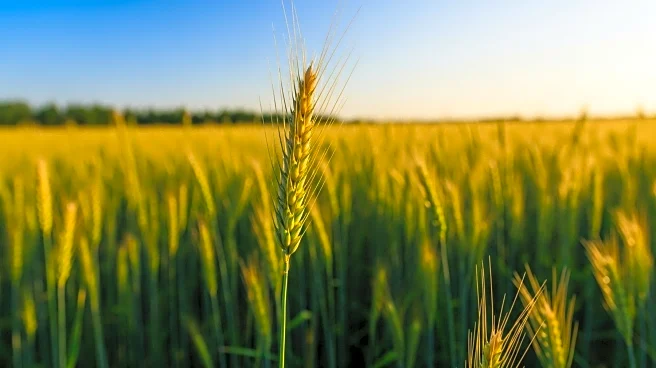What's Happening?
The Buenos Aires Grain Exchange has announced that Argentina's 2025/26 wheat crop is expected to achieve above-average yields due to abundant rainfall and strong soil moisture levels. The exchange reported that 99.5% of the 6.7 million hectares planted with wheat are in normal-to-excellent condition, bolstered by record rainfall in key producing areas during July and August. This optimistic forecast follows last season's planting of 6.3 million hectares, which resulted in a production of 18.6 million tons. Argentina remains a significant global exporter of wheat, primarily to Brazil and Indonesia. Additionally, the exchange noted that the 2024/25 corn crop harvest is nearly complete, with an estimated production of 49 million tons.
Why It's Important?
Argentina's wheat production is crucial for global markets, particularly for countries like Brazil and Indonesia that rely on its exports. The forecasted above-average yields could enhance Argentina's position in the global wheat market, potentially stabilizing prices and ensuring supply continuity. This development is significant for international trade and food security, as fluctuations in wheat production can impact global food prices and availability. The positive outlook for the wheat crop also reflects the importance of favorable weather conditions in agricultural productivity, highlighting the role of climate patterns in shaping economic outcomes for agricultural sectors.
What's Next?
As the wheat crop progresses, stakeholders will closely monitor weather conditions to ensure the forecasted yields are realized. The Buenos Aires Grain Exchange will likely continue to provide updates on crop conditions and production estimates. Farmers and exporters will prepare for the upcoming harvest season, focusing on logistics and market strategies to capitalize on the anticipated high yields. Additionally, international buyers may adjust their procurement plans based on Argentina's production forecasts, potentially influencing global wheat trade dynamics.
Beyond the Headlines
The reliance on favorable weather conditions underscores the vulnerability of agricultural sectors to climate variability. While abundant rainfall has benefited Argentina's wheat crop this season, future climate shifts could pose challenges. This situation highlights the need for sustainable agricultural practices and climate adaptation strategies to mitigate risks associated with unpredictable weather patterns. Furthermore, the success of Argentina's wheat crop may influence regional agricultural policies and investment in climate-resilient farming techniques.









